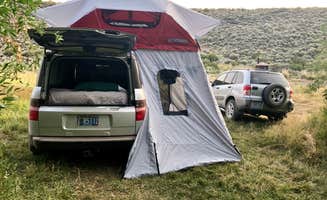Dispersed camping near Frenchglen, Oregon offers visitors access to the high desert ecosystem of the Great Basin region. Located at approximately 4,200 feet elevation, this area features dramatic terrain where the Harney Basin meets the western edge of the Basin and Range Province. Summer temperatures often range from 45°F at night to 95°F during the day, with significant daily fluctuations common throughout all seasons.
What to do
Antelope watching: Hart Mountain Antelope Refuge provides exceptional wildlife viewing opportunities. A camper at Camp Hart Mountain notes, "Lots of wildlife here in the wetlands and meadows of the Warner Valley." The refuge hosts approximately 300 species of wildlife including mule deer, bighorn sheep, and numerous bird species.
Photography at sunrise: The eastern slopes of Steens Mountain create dramatic shadows during early morning hours. A visitor to Steens Mountain Loop Road Dispersed Campsite reports, "A short rough road takes you a few hundred yards of the main gravel road to the top of a ridge. Nice views, but also seclusion due to junipers."
Desert exploration: The Alvord Desert features a dry lake bed that can be traversed on foot or with appropriate vehicles during dry conditions. According to a camper at Frog Spring in Alvord Desert, it offers a "pretty cool site in the desert with mountain ranges surrounding you."
What campers like
Isolation opportunities: Many sites near Frenchglen provide genuine solitude. At Crowley Road Dispersed Site, visitors appreciate the lack of traffic, with one noting they "Saw no cars all evening on this remote gravel road."
Historical structures: The former Civilian Conservation Corps (CCC) camp adds historical interest to some camping areas. A camper at Camp Hart Mountain shares that "This is a free campground at a former CCC camp in use during the Great Depression. Crews house here built the Hart Mountain road that passes through the Hart Mountain Antelope Refuge. The bunkhouse remains."
Diverse terrain: The region transitions between high desert plateaus, wetlands, and mountain slopes within relatively short distances. Camping locations offer distinctly different experiences based on elevation and proximity to water sources.
What you should know
Water management: Potable water is extremely limited throughout the region. One camper at Camp Hart Mountain advises, "Fill up on water when you get to the little ranger station so you don't have to pack water up the hill."
Road conditions: Many access routes deteriorate significantly after leaving maintained roads. A visitor to Frog Spring describes, "the drive in goes from pavement, to gravel, to dirt roads with some gnarly trenches at the end but it's not too bad and definitely worth it."
Site availability: Most dispersed camping areas near Frenchglen operate on a first-come, first-served basis with no reservation systems. Popular locations can fill quickly during peak seasons, particularly weekends from May through September.
Tips for camping with families
Insect protection: Areas near creeks can have significant mosquito populations, especially early summer. A camper warns, "If you stay by the creek, expect mosquitos."
Temperature preparation: Pack clothing for temperature swings of 40+ degrees between day and night. Nights remain cool even during summer months, requiring appropriate sleeping bags rated for temperatures below 50°F.
Site selection: Position tents or vehicles on previously used sites to minimize environmental impact. The fragile desert ecosystem recovers very slowly from disturbances. Look for areas with natural wind protection, as afternoon gusts can be strong.
Tips from RVers
Vehicle clearance requirements: Most dispersed sites near Frenchglen require higher-clearance vehicles. Many roads have washboards, ruts, or rocky sections that make access challenging for standard passenger vehicles.
Size limitations: Many sites cannot accommodate larger RVs or trailers. At Crowley Road Dispersed Site, pull-offs accommodate smaller rigs but lack turnaround space for longer vehicles.
Resource management: With limited services, RVers must be entirely self-contained. Plan for no dump stations, potable water fill locations, or trash disposal within 50+ miles of most camping areas.




